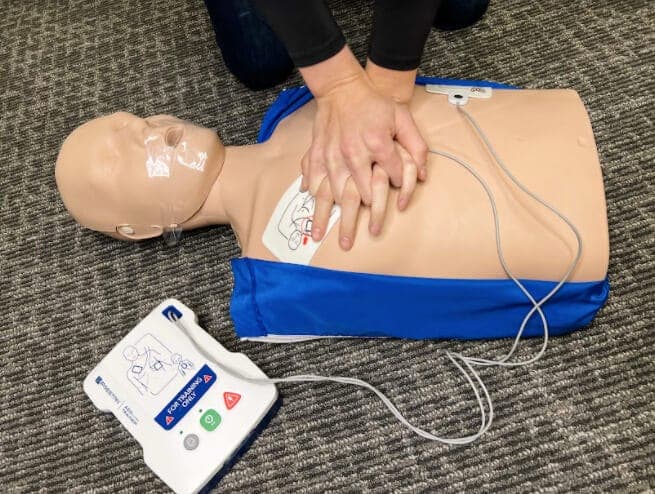Renewing Your CPR Certification In 5 Steps

CPR is a lifesaving technique that anyone can be trained in. The training is available to anyone from toddler to senior and is something most anyone can do. On the most basic level, we know that performing chest compressions on a person allows blood to continue to circulate through their body when it otherwise would not. Through the circulation of blood, people receive vital oxygen that allows their organs to remain viable. While this is a simple explanation of how CPR works, there is still continuing research being conducted that helps us learn how to perform CPR better. Because of this, CPR guidelines have been updated every 5 years for the last several decades and individuals may need to renew CPR certification to stay current.
Do I have to retake CPR if I have already been trained?
The first time the performance of chest compressions was documented was in 1891. These compressions were performed by Dr. Friedrich Maas, a German surgeon. Maas was the first to perform cardiac massage and chest compressions. Before him, there were many ideas on techniques that may revive people who no longer had a pulse.
However, it wasn’t until the 1950’s that chest compressions were paired with mouth to mouth breaths. The combination of these two techniques is called cardiopulmonary resuscitation (CPR). Since then, there have been many variations of CPR guidelines. We are continually studying what produces better outcomes in victims of sudden cardiac arrest.
We have learned so much in the last 5-50 years of CPR performance. Because of this, it’s really important that people required to have CPR certification, also have their CPR certification updated.
Old school thinking used to assume that Doctors would be the highest authority on medical knowledge. However, healthcare providers become more and more specialized and very knowledgable in smaller scopes of practice. It’s important that we look to experts that have dedicated their time to study CPR to educate us on best practices. For this reason, every person that has a healthcare license must continually renew their CPR certification.
How Often Do You Have To Renew CPR Certification?
CPR certification is valid for two years whether taught through the American Heart Association, the American Red Cross, or the Health & Safety Institute. Generally people renew in their last month of certification to make sure there is no lapse in their ability to work.
Where Can I Renew my CPR Certification?
Vitali offers CPR to the public. There are several classes a week that you can sign up for at your convenience. If you have a group of people or an office needing training, we can schedule private classes at your location or ours.
If you are outside our service areas, you can find CPR instructors near you using the Class Eagle Instructor Directory. The Class Eagle Directory allows you to search for any kind of CPR course whether you are looking for Basic Life Support (BLS) training for healthcare providers or regular lay responder CPR.
How much does CPR certification renewal cost?
Generally CPR renewal classes cost the same as an initial certifications. The AHA and ARC used to offer significantly shorter training sessions for
people renewing their certification, however after this was studied, it has been shown that people need more thorough training. CPR classes should have a significant amount of hands on training with manikins to educate people well enough. Because of this most training organizations don’t offer the renewal course but teach the initial course to everyone.
For those people who feel like they are very competent in their CPR skills, we recommend the AHA online blended learning courses. These courses allow you to take the training online and then perform the hands on skills with an instructor to receive a new CPR certification. With this format, students can learn at their own pace and anywhere that is convenient- home, work, or school.
What are the benefits of renewing my CPR certification?
For a lot of people, maintaining CPR certification is a requirement. The benefits are found in your ability to respond in the event of an emergency and additionally you are protected in your career for properly maintaining job requirements. Furthermore, renewal of your CPR certification is beneficial to anyone as we have discussed how CPR guidelines change frequently. In the event of an emergency, you will want to know that most effective way of performing CPR as a loved ones life may be counting on you.
Can I renew my certification online?
As we have discussed, there are online blended learning options through the American Heart Association and the American Red Cross. However, any legitimate and recognized training requires hands on practice and testing with an instructor. Anyone doing training differently is giving out unrecognized certifications. This can be tricky to navigate as a student so we recommend reading this article on ‘How to Spot Fake CPR Certification Cards.’ Also, read here the latest AHA guidance on virtual training.
Steps to CPR Renewal:
- Find out when your current CPR training expires and make sure to renew at least by the last month it is valid.
- If you need CPR certification for work, find out from your employers if you need a specific certification. (Some employers may only take certification directly from the American Red Cross or the American Heart Association)
- Search the Class Eagle Health and Safety Directory for an instructor local to you.
- Sign up for a course and be sure to pay in advance if it’s required. (Most classes fill up and require registration and payment ahead of time.)
- Attend your CPR Renewal Class
Depending on the instructor, you should receive your certification within the next 20 business days. However, most instructors send certifications much sooner.



